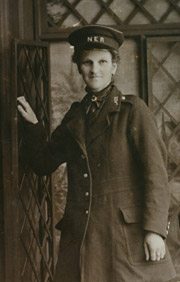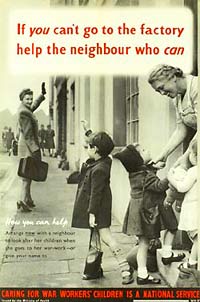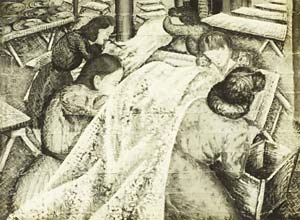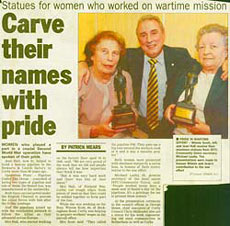It's a man's world
As the demands of modern war on a country's resources have increased, the roles of women in supporting the war effort have also diversified.
During the First World War in the United Kingdom it was no longer enough for a woman to keep the home together. Women were needed to replace men on the farms, in the factories and to keep transport running. Extending the vote to women over the age of 30 in 1918 was an acknowledgement of their contribution to the war effort.

Photograph of Mrs Eliza Chapplow (b 1874) in North Eastern Railway uniform
Mrs Chapplow (née Harrison) served as stationmaster/porter at Forest Hall Station, near Newcastle upon Tyne, in place of her husband, Isaac, while he was fighting on the Western Front during the First World War. (Private collection)

Land Army girls at work in the fields during the Second World War
Working on the land was often hard, wet, cold and dirty work for young women not brought up to the rigours of life on a farm. (AFSP 72)
Women whose domestic responsibilities entitled them to remain at home were expected to support those who were working. From the outset of the Second World War women were required to bolster the war effort and in December 1941 conscription for women was introduced, either in the munitions and war related industries or the Women's Auxiliary Services.

Propaganda poster from WWII (WWP 16/6)
By 1944 about 80,000 women were employed in the Women's Land Army alone, while women in the United Kingdom, the Soviet Union and United States of America kept the munitions and military industries going, proving that even in heavy industries women could do a man's job when required.
This is one of a series of murals painted on the baffle walls built to protect the university buildings during the Second World War. The artist, Evelyn Gibbs (1905-1991), a lecturer at Goldsmith's College, London, was evacuated to Nottingham in 1939. She was one of the first women to win the Prix de Rome for Engraving and her work is now highly regarded.

Textile workers mural at University College, Nottingham
These photographs are all that remain of the murals as they were destroyed when the walls were demolished in September 1945.

Award to Operation PLUTO pipeline workers
Jean Hall and Winnie Scott worked in the Corby steelworks on the secret Pipeline Under The Ocean (PLUTO), which supplied fuel for the Allied forces landing in Normandy in June 1944 (Private collection)
In between milking there was fieldwork to be done, different types of work as to the season of the year. Muck spreading by fork from a horse drawn cart, clearing thistles, hoeing and singling turnips and swedes, treading grass and molasses in silos for cattle winter feed.
Doris Una Ball in the Women's Land Army during the Second World War
Sugar beet sowing - the lad leading the horse - I walked behind the drill box, making sure it contained plenty of seed and the distributors had not clogged up. We must have walked miles by the end of the day.
Olga Yeates in the Women's Land Army during the Second World War
The work force consisted of mainly women plucked from the lace and clothing factories, they proved themselves more than capable of the intricate machine weaving of various cords and other wiring needs geared to the war effort.
Barbara Beales remembering life in Nottingham during the Second World War
I was just working with these 3 blokes, cutting the tubes, you cut the bad bits out so that you had a good piece then they went away to get joined to make the pipes for to go across the sea.
Jean Hall working on 'Pluto' in the steelworks at Corby during the Second World War
Next: In the line of fire